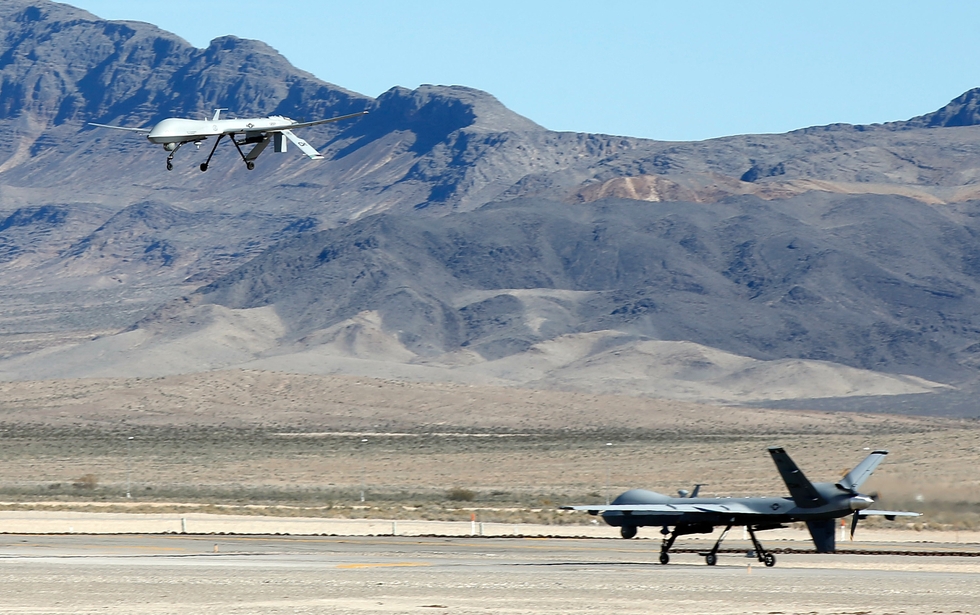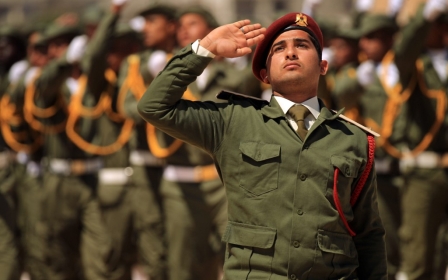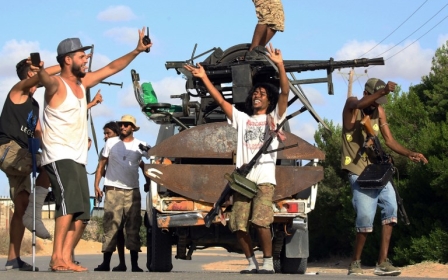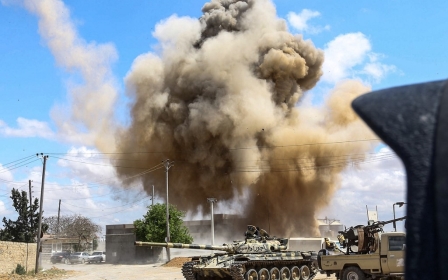Haftar forces pushed back in Tripoli despite reports of drone strikes: Witnesses

Forces loyal to Libya's internationally recognised government have pushed their eastern opponents back on parts of the frontline south of Tripoli, despite the attackers reportedly using drones for overnight air strikes on the capital, witnesses said on Sunday.
The Libyan National Army (LNA) force loyal to commander Khalifa Haftar allied to a parallel government in the east started an offensive more than two weeks ago but has been unable to breach the southern defences of the Tripoli government.
Forces loyal to Tripoli managed to push back the LNA several kilometres in the southern Ain Zara suburb, Reuters reporters visiting the area said.
The journalists said they had managed to go several kilometres further south than when they visited the same frontline a few days ago.
However, the LNA has still gained a considerable amount of territory, as they now control much of the area south of Tripoli, including a forward base in Gharyan, a mountain town some 80km south of Tripoli.
LNA spokesman Ahmed Mismari denied his forces had retreated, telling reporters they had actually gained territory after what he called a successful air strike.
Mismari added that the advance into Tripoli had slowed because of the dense population in the urban areas where fighting was taking place.
He also told reporters the LNA was calling in reservists to open new fronts around the capital, according to Reuters.
Drone reports
The attackers had late on Saturday flown air strikes on southern areas of Tripoli which shook the capital, with residents blaming drones after listening for almost an hour to the typical hum of an unmanned aircraft.
A Reuters reporter and several residents said they saw an aircraft circling for more than 10 minutes over the city accompanied by the sound before opening fire on a southern suburb, scene of the heaviest fighting between the rival forces.
Reuters was unable to confirm whether an aircraft or unmanned drone was behind the strike which triggered heavy anti-aircraft fire.
Residents had reported drone strikes in the past few days but there has been no confirmation and explosions heard in the city centre this time were louder than in previous days.
Residents counted several missile strikes which apparently hit a military camp of forces loyal to Tripoli in the Sabaa district.
Authorities had closed Tripoli's only functioning airport but reopened it hours later, the airport's website said.
'An attack by a foreign invading power'
Since 2014, the United Arab Emirates and Egypt have provided the LNA with military equipment such as aircraft and helicopters, helping Haftar to gain the upper hand in Libya's eight-year conflict, past UN reports have established.
The UAE created a drone facility at al-Khadim airbase, south of the Libyan capital, in 2016, and experts say the ageing fighter jets available to Haftar cannot fly by night, making it highly likely that drones were used.
Peter Millett, the former UK ambassador to Libya, told the Guardian: "The use of drones was a significant and tragic escalation that will increase the number of Libyan casualties."
Speaking to the UK newspaper, Anas El Gomati, director of the Sadeq Institute, a Libyan think tank, said: "The air war in Tripoli has officially entered a dangerous new phase and has the become an attack by a foreign invading power: the UAE.
"Libya is still Libya, but it’s on the verge of becoming a Yemen on the Mediterranean. Haftar’s promise of enduring peace and stability is a myth. UAE drone strikes cannot deliver unity."
The air strikes, which were also filmed by residents in video posted online, came after a day of heavy clashes in southern districts, with shelling audible in the city centre.
Trump boost to Haftar
The violence spiked after the White House said on Friday that President Donald Trump spoke with Haftar earlier in the week.
The disclosure of the call and a US statement that it "recognised Field Marshal Haftar's significant role in fighting terrorism and securing Libya's oil resources" has boosted the commander's supporters and enraged his opponents.
Western powers and the Gulf have been divided over a push by Haftar's forces to seize Tripoli, undermining calls by the United Nations for a ceasefire.
Both sides claimed progress in southern Tripoli on Saturday, but no more details were immediately available.
On Thursday, both the US and Russia said they could not support a UN Security Council resolution calling for a ceasefire in Libya at this time.
Russia objects to the British-drafted resolution blaming Haftar for the latest flare-up in violence when his LNA advanced to the outskirts of Tripoli earlier this month, diplomats said.
The US did not give a reason for its decision not to support the draft resolution, which would also call on countries with influence over the warring parties to ensure compliance and for unconditional humanitarian aid access in Libya.
Middle East Eye delivers independent and unrivalled coverage and analysis of the Middle East, North Africa and beyond. To learn more about republishing this content and the associated fees, please fill out this form. More about MEE can be found here.






